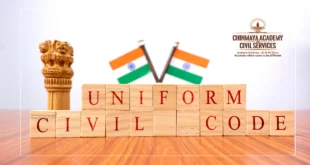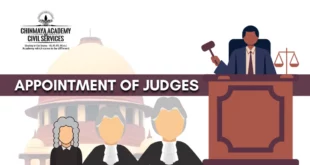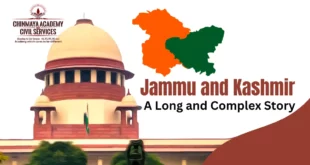Context: The Supreme Court and the Union Government have prioritized the issue of undertrial prisoners, introducing measures like Section 479 of the BNSS, 2023, to address the growing concerns effectively. State of Undertrial Prisoners in India High Proportion of Undertrials: As per NCRB’s Prison Statistics India 2022, 75.8% of incarcerated …
Read More »Judiciary
Bulldozer Justice
“Bulldozer Justice” refers to the controversial practice in India where authorities use heavy machinery, such as bulldozers, to demolish properties belonging to individuals accused of serious crimes like communal violence, murder, or rape. These actions are often criticized for bypassing the due legal processes mandated for demolishing immovable properties, raising …
Read More »National Health Infrastructure: NHCE, DHIS, NHA
Introduction India’s healthcare system faces significant challenges, including fragmented data, inefficient claim processing, and limited access to digital health services. The National Health Authority (NHA) has introduced key initiatives to address these issues, including the National Health Claim Exchange (NHCE) and the Digital Health Incentive Scheme (DHIS). Understanding these programs …
Read More »Juvenile Justice Act of 2015 (JJ Act)
Introduction In the Pune Porsche accident case, there have been suggestions that the accused should be tried as an adult rather than as a juvenile under the Juvenile Justice (JJ) Act. The Juvenile Justice (Care and Protection of Children) Act, 2015 is a comprehensive legislation enacted by the Indian Parliament, …
Read More »Judicial Appointments: Political Neutrality in Global Perspective
GS Paper 2 : Mains: Issues with Collegium system, Global Examples of appointing Judges Recently, a retiring Calcutta High Court judge revealed that he has always been a member of the Rashtriya Swayamsevak Sangh (RSS). Timeline for changes in Political Ideology in Judicial Appointments in India Historical Context Pre-1970s: Political …
Read More »Exchange Traded Currency Derivatives
TABLE OF CONTENTS News Concept Types of Exchange-Traded Currency Derivatives Currency Options News: The Reserve Bank of India (RBI) Thursday deferred the implementation of norms on exchange-traded currency derivatives (ETCDs) linked to Indian rupee until May 3 following concerns by investors. Concept : Derivatives are financial instruments whose value is …
Read More »Uniform Civil Code
A UCC would establish a single law for the entire country, governing all religious communities in personal matters such as marriage, divorce, inheritance, and adoption. In other words, the UCC is a set of rules/regulations that proposes replacing personal laws based on the scriptures and customs of each major religious …
Read More »Anti-Defection Law
Purpose – Prevent lawmakers from defecting politically. By virtue of the 52nd Amendment Act of 1985, the Tenth Schedule—also referred to as the Anti-Defection Act—was added to the constitution. It establishes the guidelines for disqualifying elected officials for defecting to a different political party. if a legislator or political party member …
Read More »Appointment of Judges
Why in NEWS On Monday (08.01.2024), India’s Chief Justice D.Y. Chandrachud announced that in order to consider a petition to abolish the collegium system of judicial appointments, a Supreme Court bench would need to be assembled. Historical background India adopted the Constitution in 1950, following its independence. The Chief Justice …
Read More »Assent has been given by President toNew Criminal Justice Bills
Following their approval by Parliament last week, the three new criminal justice bills got President Droupadi Murmu’s assent on Monday. the Bharatiya Nyaya Sanhita, the Bharatiya Nagarik Suraksha Sanhita and the Bharatiya Sakshya Act — will replace the Indian Penal Code, the Code of Criminal Procedure and the Indian …
Read More »The Unlawful Activities (Prevention) Act (UAPA) of 1967
The Unlawful Activities (Prevention) Act (UAPA) of 1967 is an Indian law that aims to prevent unlawful activities of individuals and associations. The law was first enacted to deal with anti-national activities and secessionist movements. The law’s main objective is to provide powers to deal with activities that threaten the …
Read More »Jammu and Kashmir: A Long and Complex Story
Jammu and Kashmir boasts a rich and complex history spanning millennia, marked by diverse rulers, religious influences, and political upheavals. Here’s a brief overview of key historical events: Ancient Times (3000 BC – 13th Century AD): Indus Valley Civilization flourished in the region, leaving behind remnants in Burzahom and Gufkral. …
Read More »Criminalization of Adultery on a Gender-Neutral Basis
The story so far The criminalization of adultery on a gender-neutral basis was recommended by the Parliamentary Standing Committee on Home Affairs last month after reviewing the three new criminal law Bills that will replace the Indian Penal Code (IPC), Code of Criminal Procedure (CrPC), and Indian Evidence Act. This …
Read More »Abortion Laws in India
Context A Supreme Court Bench says an unborn child has rights, and a woman’s autonomy is also important. In India, pregnancy can be terminated with the help of a registered medical practitioner in cases related to safeguarding the mother’s physical and mental health. The termination of pregnancy is governed by …
Read More »Bill seeks to remove CJI from panel that picks CEC and ECs
Syllabus: Structure, organization and functioning of the Executive and the Judiciary Context In a controversial move, the Union government on Thursday introduced a Bill to remove the Chief Justice of India (CJI) from a panel to select the Chief Election Commissioner and Election Commissioners. In Detail Instead of the CJI, …
Read More »PENNAIYAR TRIBUNAL
The time limit fixed by the Supreme Court for the constitution of an inter-State river water disputes tribunal for Pennaiyar river expired and Tamil Nadu is waiting for the Centre’s next course of action. In 2018, Tamil Nadu filed an original suit against Karnataka constructing check-dams and diversionary structures on the river. In 2019, …
Read More »COURT MARTIAL
An Army captain was court-martialled after a Court of Inquiry (CoI) and subsequent summary of evidence found that troops under his command had exceeded their powers under the Armed Forces (Special Powers) Act. Court-martial is a procedure for trials of the military personnel for violating the military laws or making any military offences. It is conducted in …
Read More »GST REGIME’S FLAWS
Meeting in person after nearly eight months, the GST Council last Saturday reached a broad consensus on establishing GST Appellate Tribunals to resolve disputes under the tax regime launched in July 2017. After some fine print changes in consultations with States, the Finance Ministry hopes to include the legislative backing …
Read More »FORCED VIRGINITY TEST IS UNCONSTITUTIONAL: HC
The Delhi high court on Tuesday held that forced virginity test on persons in police or judicial custody is unconstitutional stating that strangely, though the word “virginity” may not have a definite scientific and medical definition, it has become a mark of purity of a woman. It is declared that …
Read More »ADVANCE MEDICAL DIRECTIVES’
When the Supreme Court granted legal status to the concept of ‘advance medical directives’ in 2018 and allowed passive euthanasia, subject to stringent safeguards, it was seen as a vital recognition of both patient autonomy over end-of-life decisions and the right to a dignified death. However, doctors later found that …
Read More » Chinmaya IAS Academy – Current Affairs Chinmaya IAS Academy – Current Affairs
Chinmaya IAS Academy – Current Affairs Chinmaya IAS Academy – Current Affairs













